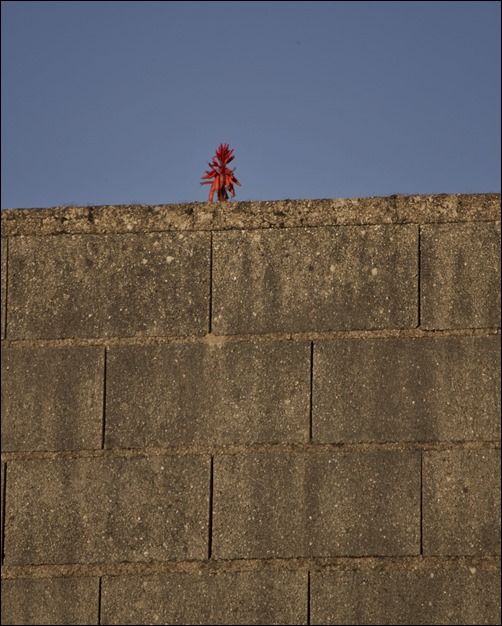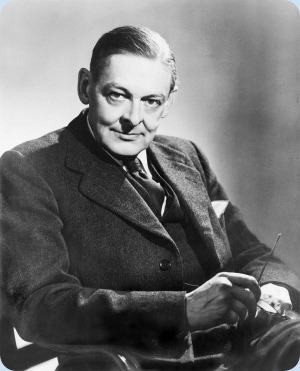| A Cadeira na que ela sentaba, como un trono brunido,
brillaba sobre o mármore, onde o espello
sostido por columnas labradas de vides con acios
entre as que asomaba un dourado Cupido
(outro escondía os seus ollos detrás dunha á)
duplicaba as lapas do candeeiro de sete brazos
reflectindo a súa luz na mesa mentres
que o fulgor das súas xoias subía para atopala,
de estoxos de satén espallándose en rica abundancia;
en frascos de almafí e colorido cristal
destapados, escondíanse os seus raros perfumes artificiais,
ungüento, pulverizado, ou líquido… enturbaban, atrapallaban
e afogaban o senso os aromas; axitados polo ar
afrescante da xanela, estes ascendían
fornecendo as alongadas lapas das candeas,
lanzando o seu fume ata a laquearia,
salientando o deseño do artesoado.
Un gran madeiro de barco incrustado de cobre
ardía verde e laranxa, enmarcado pola pedra de cores
en cuxa tristeira luz nadaba un arroaz entallado.
Enriba da antiga lareira mostrábase,
como se unha xanela dese á selvática escena,
a transformación de Filomela, polo bárbaro rei
tan rudamente forzada; mais alí o rousinol
enchía todo o deserto con voz inviolable
e aínda ela choraba, e aínda o mundo persegue,
«chac chac» en sucios ouvidos.
E doutros murchos tocos de tempo
contábase nas paredes; espreitantes formas
debruzadas, inclinándose, acalando a habitación pechada.
Pasos que esvaraban pola escaleira.
Baixo a luz do lume, baixo o cepillo, o seu cabelo
esparexíase en puntos labareantes
brillando nas palabras, e entón salvaxemente aquedaba.
«Teño os nervios mal esta noite. Si, mal. Queda comigo.
Fálame. Por que non falas nunca. Fala.
Que estás a pensar? Que pensas? Que?
Nunca sei o que estás a pensar. Pensa.»
Penso que estamos na calella das ratas,
onde os mortos perderon os ósos.
«Que é ese ruído?»
O vento por baixo da porta.
«Que é esoutro ruído? Que fai o vento?»
Nada, outra vez nada.
«Ti
non sabes nada? Non ves nada? Non lembras
nada?»
Lembro
que esas perlas foron os seus ollos.
«Estás vivo ou non estás? Non tes nada na cabeza?»
Pero
oh oh oh oh, ese ritmo shakespeheriano…
é tan elegante,
tan intelixente.
«Que vou facer agora? Que vou facer?
Sairei ás présas como estou, e andarei pola rúa
co pelo solto, así. Que imos facer mañá?
Que imos facer nunca?»
A auga quente ás dez.
E se chove, un taxi ás catro.
E imos botar unha partida de xadrez,
apertando os ollos sen pálpebras e agardando un golpe na porta.
Cando licenciaran o marido de Lil, díxenlle eu…
non tiven lixos na lingua, díxenllelo na cara,
APUREN POR FAVOR XA É HORA
Agora que torna Albert, poñeraste un pouquiño guapa.
Vai querer saber que fixeches cos cartos que el che dera
para arranxáre-los dentes. Dérachos, estaba eu alí.
Quítaos todos, Lil, e pon unha dentadura xeitosa,
díxocho, xúroo, non podo aguantar mirarte.
Nin eu podo, dígolle, e pensa no pobre do Albert,
botou catro anos no exército, precisa pasalo ben,
e o que ti non lle deres, outras daranllo, dígolle.
Ai, e logo é iso, di ela. Non digo que non, dígolle eu.
Pois xa sei a quen llo terei de agradecer, di ela, mirándome aos ollos.
APUREN POR FAVOR XA É HORA
Se non fas caso, podes seguir igual, dígolle.
Outras poderán escoller, se ti non podes.
Pero se Albert marcha, non será por non te avisaren.
Debería che dar vergoña, dígolle, de aparentares tan andada.
(E ten só trinta e un.)
Non podo facer outra cosa, di ela, poñendo cara de can,
son as pílulas aquelas que tomei, para provocalo, di ela.
(Xa leva cinco, e a pouco morre con George, o pequeno.)
O da botica dixera que todo ía ir ben, pero eu non volvín se-la mesma.
Ti es parva de vez, díxenlle.
Pois, se Albert non che deixa estar, iso é o que pasa, díxenlle,
para que casaches se non queres nenos?
APUREN POR FAVOR XA É HORA
Pois logo, o domingo Albert estaba na casa, tiñan pernil asado,
e invitáranme á cea, para probármolo quentiño…
APUREN POR FAVOR XA É HORA
APUREN POR FAVOR XA É HORA
Boanoite Bill. Boanoite Lou. Boanoite May.
Boanoite.
Abur abur. Boanoite. Boanoite.
Boas noites, damas, boas noites, xentís damas, boas noites,
boas noites. |


0 comentarios:
Deixar un comentario na entrada